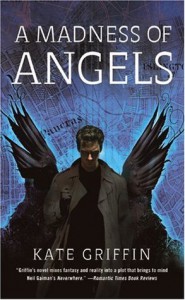book reviews forevermore
Goodreads refugee and wordpress blogger
“The more I read, the more I acquire, the more certain I am that I know nothing.”
― Voltaire
A Madness of Angels--the real review

Sometimes an author captures my imagination, and as long as they fail to become blazingly incompetent, I’m along for the ride. So it was with A Madness of Angels.
Matthew Swift wakes up from death, lost, confused, unaware its been two years since he died, as for him it feels like moments ago. The terrible and fascinating hook to his story is that as a sorcerer, he was dialing the phone as he died–and the phone lines are the home of the electric blue angels, the bits and pieces of humanity spun out over the wires and taking on life of their own. When Matthew is brought back to life, he is no longer alone in his familiar body–he shares it with the electric blue angels, along with their talents.
“We be light, we be life, we be fire!
We sing electric flame, we rumble underground wind, we dance heaven!
Come be we and be free!”
Griffin’s concept is given life (pardon the pun) by a fascinating use of language, a type of lyricism rarely seen in urban fantasy and which reminded me as much of scat and bebop as a written narrative. And, as I pointed out in a Booklikes post, more than a little bit of Fame’s “I Sing the Body Electric.” Although I enjoy a wide range of music, my reading experience and my musical listening experience are almost always two separate things; Griffin provided me a rare experience and enjoyment with her lyrical writing. With the musicality of the narrative, all I needed was a semi-coherent plot and I was sold. Thankfully, the rest of the details were more than competent.
A hallmark of many types of urban fantasy and mysteries are the emphasis on location. The setting is virtually a character, providing mood, spiking thought, inciting action. London is a chief player in this series, and with loving and full detail, it is clear Griffin is no mere tourist (I once read an apocalypse book set in a New York that the author very clearly had only visited–if seen in person at all). Some places are so iconic that they take on a role beyond their actuality. Hollywood is one of those places–dirty, dingy, filled with the outcasts of humanity and cockroach-infested diners, the imaginary Hollywood bares little resemblance to the reality. Not this London. This one is very real,with tired commuters, overflowing rubbish bins, and confusing and obscure tube system. I liked it, and because the angels are new to the corporeal experience, their joy in the details, in all their glamorous and dirty variety, was contagious.
If the rest of the characters weren’t quite as developed as Swift/Angels and London, they were still reasonably done. There is a nice ambivalence surrounding Matthew’s former teacher Bakker, for his role in teaching him the craft and his ultimate path. Oda, an anti-magic fanatic, has little finesse to her arc, but is done well enough that it added an element of tension. Sinclair and Charlie were very interesting and not at all predictable.
Magic has an unusual flair as well. It is supposed to be ‘urban’ magic, evolving to its place and time, and one of the first malevolent creatures encountered is a trash-beast. Then there’s the magic of the city–the rituals of public transport gating, the mystery of the ATMs. I loved the graffiti-magic angle; and a perfect twist on the out-front yet underground language of the city, decipherable to those in the know. The magical healer connected to the NHS cracked me up. The city creatures are perhaps not precisely magical, but echo real life cities with an abundance of pigeons, rats and foxes. The Beggar King and Bag Lady were nice magical elements, echoing the parable of those least among us. Griffin cleverly avoids the over-powered magical protagonist as well. As Matthew is so new to his body and abilities from the electric angels, there’s believable limits on what he is reasonably able to accomplish, despite the abilities of both sorcerer and electric angels.
Plot is perhaps the least unusual aspect of the story, but with so much going on with narrative and magic, it’s rather nice to have something sort of straightforward. Swift and the angels seem to agree on revenge, and part of toppling a mighty sorcerer means toppling the pillars that support him. I’m not entirely sure this worked logically in any sense of the word, since everyone was on the defensive after the first went down, and because the sorcerer seemed more than capable of taking care of himself without said supports. The mystery surrounding Matthew’s death was rather unsurprising, as well as the ultimate denouement.
That said, I’ll undoubtedly read it again–a story that hinges on narrative, character and world-building is enjoyably revisitable. The enthusiasm Swift and the angels have for life is contagious, and make it a moderately uplifting read. This is one that needs to be added to my personal collection. Highly recommended, but only for those that can tolerate a certain poetic laxity of narrative.








 26
26
 5
5